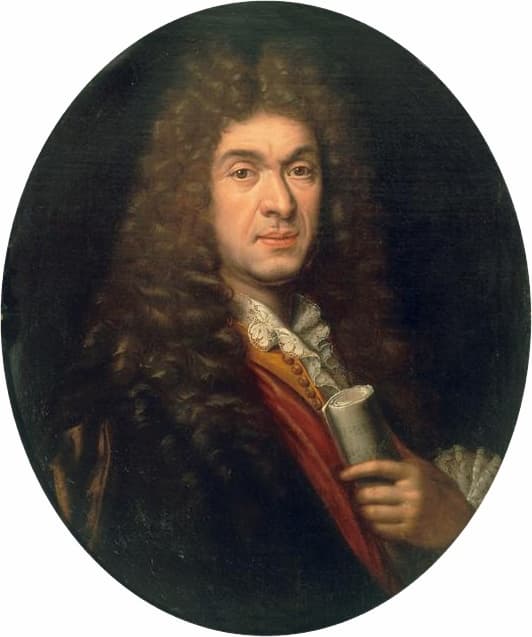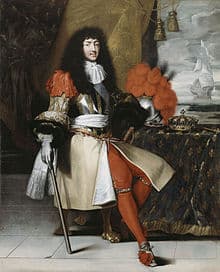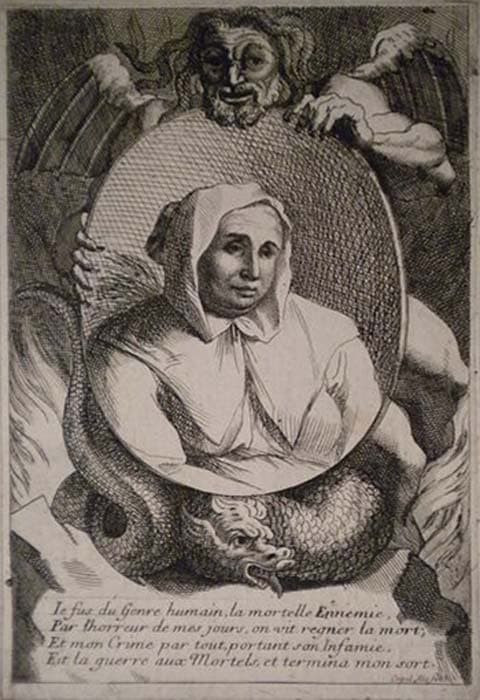Jean-Baptiste Lully (1632-1687) originally hailed from Florence, and he was essentially known as a cheeky street musician in his youth. His talents, musical and otherwise, were recognized, and he ended up as an Italian language tutor to Louis XIV’s cousin Anne-Marie-Louise d’Orléans in Paris. He served as her chamber boy but concurrently continued his musical education, and he became known as “Baptiste le grand baladin.” His fortunes greatly improved when Lully managed to attract the attention of the young Louis XIV, dancing with him in the magnificent Ballet royal de la nuit. Before the festivities were over, the king appointed Lully to the post of “compositeur de la musique instrumentale.” Several years older than the young king, Lully quickly became Louis’s favorite musician. Lully made himself indispensable and collaborated and participated in various court performances, and by 1661 he became a French citizen. Steeply climbing the professional ladder, he married Madeleine Lambert, the daughter of a renowned singer and composer, and the sky seemed to be the limit.
Jean-Baptiste Lully: Alceste (Judith van Wanroij, soprano; Edwin Crossley-Mercer, bass; Emiliano Gonzalez Toro, tenor; Ambroisine Bré, mezzo-soprano; Douglas Williams, bass-baritone; Etienne Bazola, baritone; Bénédicte Tauran, soprano; Lucía Martín-Cartón, soprano; Enguerrand de Hys, tenor; Namur Chamber Choir; Les Talens Lyriques; Christophe Rousset, cond.)

Portrait of Jean-Baptiste Lully by Paul Mignard
His collaboration with playwright Molière produced a number of highly successful comédies-ballets over the year. The masterpieces of the “deux Baptiste,” as Molière and Lully were called at the time, provided some of the most brilliant entertainments at Versailles. By 1672, however, they had a violent professional quarrel; Molière turned to Marc-Antoine Charpentier, and Lully acquired the royal opera privilege, becoming the director of the royal opera. Between 1673 and 1687, he produced and composed a new opera for the “Sun King” almost every year, and he fiercely protected his monopoly. As we all know, success breeds jealousy, and jealousy breeds enemies. The biggest scandal involved a lawsuit against his fellow composer Henri Guichard. In 1675, Lully sought the council of Louis XIV, claiming that Guichard tried to poison him by pouring several doses of arsenic into his snuffbox. This was a serious accusation, as a major murder scandal was rocking France at that time. The “Affair of the Poisons,” saw prominent members of the aristocracy, reaching well into the inner circle of the king, implicated and sentenced on charges of black magic and poisoning.
Jean-Baptiste Lully: George Dandin—Le grand divertissement royal de Versailles (Hilde Langfort, harpsichord; Tonkünstler Orchestra; Dietfried Bernet, cond.)

Portrait of Louis XIV of France
Lully’s accusation immediately led to the arrest and the imprisonment of Guichard at the Châtelet. The accusation was certainly well timed as it was uttered shortly after the trial of Madame de Brinvilliers, who was accused of having conspired with her lover, army captain Godin de Sainte-Croix, to poison her father Antoine Dreux d’Aubray in 1666 and two of her brothers. Brinvilliers was tortured and confessed, and she was beheaded and her body burned at the stake. It set in motion the “Affairs of the Poisons,” which lasted for almost 15 years and led to the execution of 36 people. Probably the most famous case involved the midwife Catherine Deshayes Monvoisin, also known as “La Voisin.” Accused of being responsible for a number of unexplained deaths, “La Voisin” implicated a number of important individuals in the French court as performing black masses and of dabbling in poisons. In the end, “La Voisin” was sentenced to death, and it greatly alarmed Louis XIV that he himself might become another victim.
Jean-Baptiste Lully: Suite in A minor (Vegard Lund, baroque guitar)

Catherine Deshayes, “La Voisin”, 17th-century print of her portrait held by a winged devil
At his first trial, Henri Guichard was convicted of attempted murder, but on appeal, he was released after a second trial. We don’t know whether Guichard had actually tried to poison Lully, but we do know that after his release, he fled to Spain as quickly as possible. He wrote a libretto for a forgotten opera and was soon a footnote in history himself. We do know, however, that Henri Guichard had actively tried to acquire the royal privilege held by Lully. For one, he seduced one of the best woman singers, Anne de Boscreux, and tried to persuade her to work for him. He also tried to wreck Lully’s partnership with Vigarani by negotiating with the stage designer for another academy, the Académie des Spectacles, to offer public tournaments, races and firework displays. And since we know that Lully was a famously ambitious fellow and intensely protective of his privileged position, it is entirely possible that Lully fabricated the entire poison affair. Within the general panic surrounding the “Affair of the Poisons” Lully probably found the perfect way to get rid of an unwanted rival.
For more of the best in classical music, sign up for our E-Newsletter
Jean-Baptiste Lully: Thesee (Stéphane Degout, baritone; Topi Lehtipuu, tenor; Francoise Masset, soprano; Jael Azzaretti, soprano; Le Concert d’Astrée; Emmanuelle Haïm, cond.)
